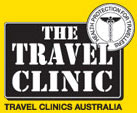A DVT is a blood clot that may form in the deep leg veins. It may travel around the body (ie embolise) and cause damage to vital organs, such as a the lungs. The jury is still out on absolute proof of air travel per se being a cause of thromboembolism. However, some people with recurrent clots or where there is a history of other family members with clots may need to be screened for the Factor V Leiden gene which predisposes to DVTs.
Cabin-related risk factors include
- immobilisation, cramped position,
- insufficient fluid intake,
- low humidity
- hypoxia
Most of these can be prevented with:
- regular calf exercises
- moving around the cabin every 2 hours
- adequate fluid intake
- avoidance of diuretics including the effects of too much alcohol or caffeine
Higher risk travellers such as those with a past history of thrombosis may be also be advised to wear supportive stockings and use self-injectable anti-thrombotic agents. Aspirin is an antiplatelet agent and is most effective on the arterial side rather than on the venous circulation but there is some evidence that it is mildly effective and may be preferred by travellers to injecting themselves.
